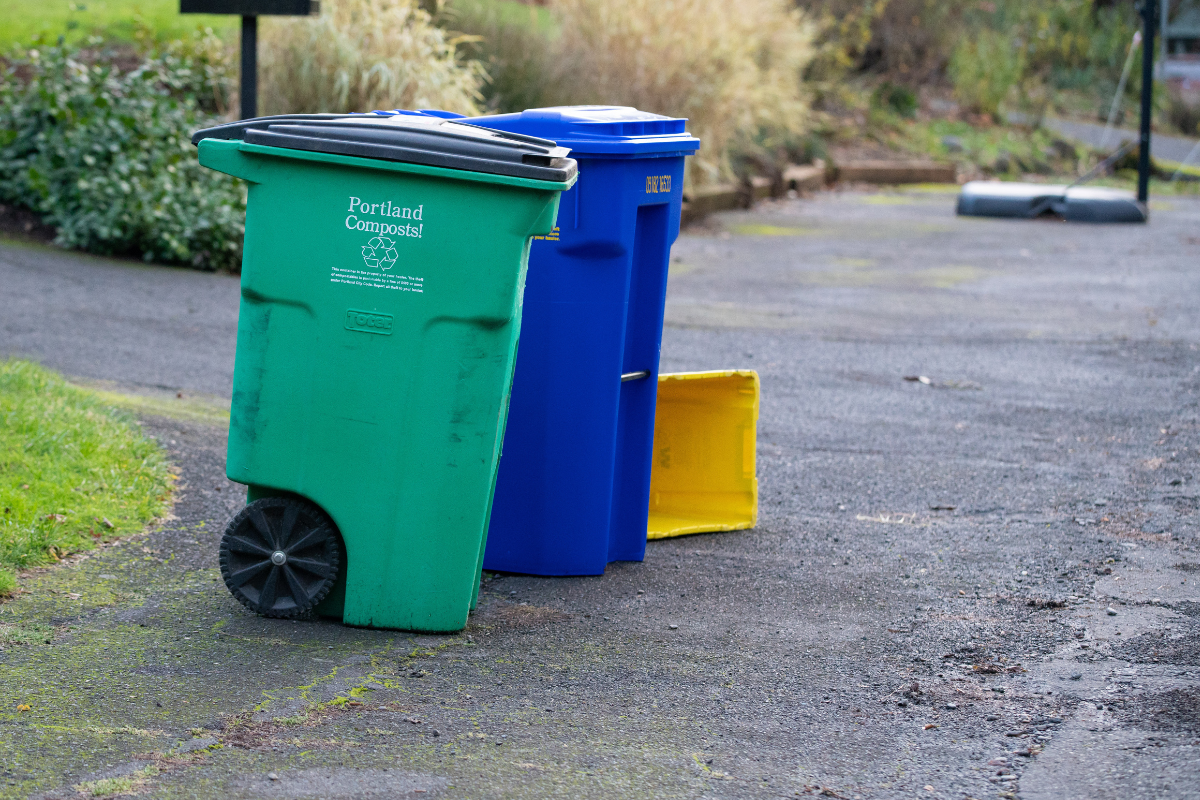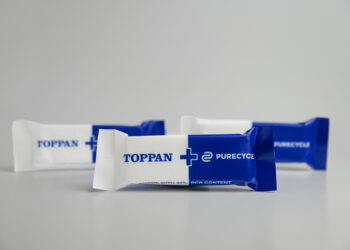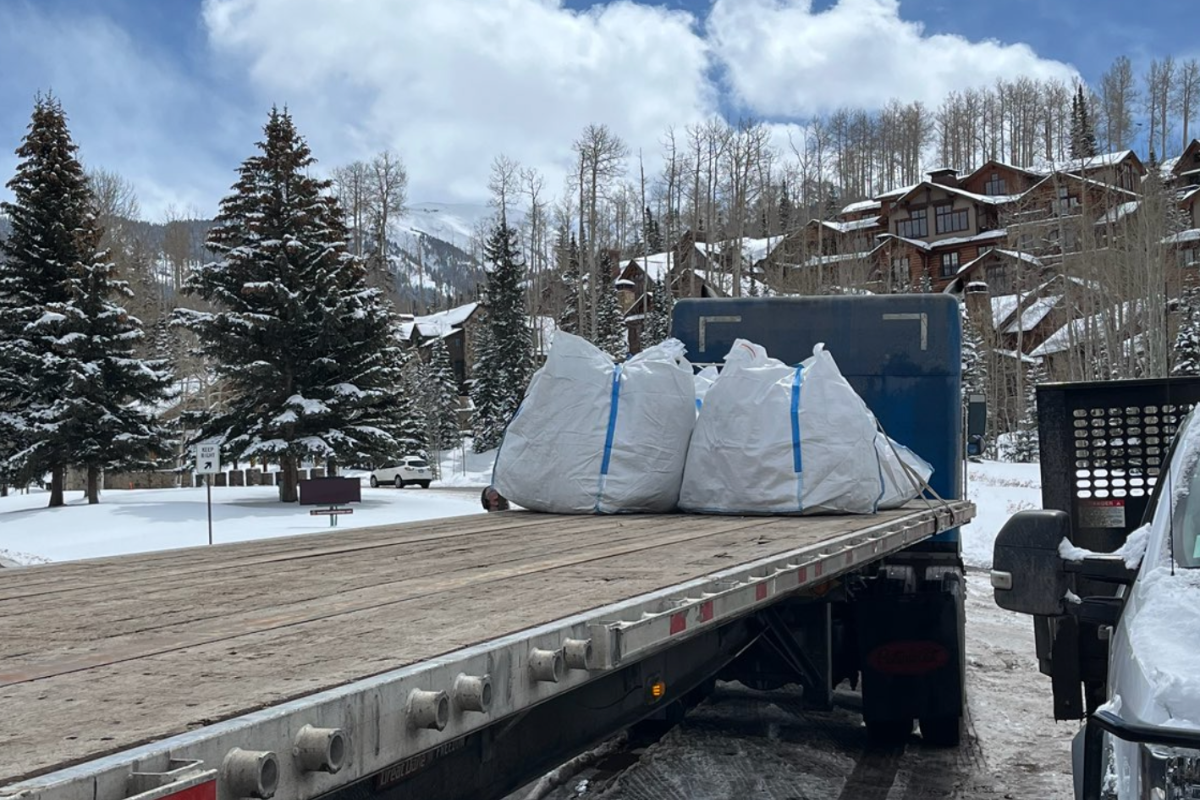This article appeared in the June 2025 issue of Resource Recycling. Subscribe today for access to all print content.
Despite a here-and-gone-again fining system, New York City’s mandated curbside composting program is bringing in more and more tons of organics every month.
“Week after week, the amount of compostable material we collect continues to increase,” said Vincent Gragnani, press secretary for the city’s Sanitation Department.
That’s despite the fact that three weeks into April, the department’s ability to levy fines for noncompliance was severely reduced, following action from the mayor’s office and pressure from some City Council members.
Looking beyond New York, the cities of Portland, Oregon, and Bellingham, Washington, also have been working to build out different levels of composting mandates — and also have leaned heavily on education instead of fines.
A slow build
The groundwork for New York City’s mandate started last year, when the Zero Waste Act, introduced by Council Member Shahana Hanif, passed. It made residential curbside organics collection mandatory. The program rolled out slowly over the next year, with all five boroughs of the city participating as of Oct. 6.
The sanitation department earlier this year estimated that with the program running in all five boroughs, it would collect over 200,000 tons of organics in fiscal year 2025. In fiscal year 2024, which ended June 30, New York City collected around 130,000 tons of organic material, an increase of 23% year over year.
Finished compost created from the collected material is both sold to landscapers and given away to community groups, parks, residents and others.
The program hit full implementation in April, because as of April 1, anyone found in violation of the mandate could be fined.
By the second week after that, the city collected “the highest amount of curbside compostable material diverted from landfill ever,” Gragnani said: 3.6 million pounds. That’s a 320% increase over the same time the year before.
The record was swiftly broken in the third week, when 4.5 million pounds were collected, a 400% increase over the same time the year before. The fourth week was once again higher, coming in at 5.24 million pounds.
“Three weeks in a row of broken records,” Gragnani said. “It’s clear that if you make it easy for New Yorkers to do the right thing — to fight rats and help the environment — they’ll do it every time.”
Fines varied based on building size and increased with each infraction. For buildings with one to eight units, fines started at $25 for the first offense, stepping up to $50 and $100 for subsequent infractions. Any larger buildings saw fines starting at $100 for the first violation, increasing up to $300.
In the first week of April, about 1,800 citations were given, the Gothamist reported, and before the fines were paused, that number had hit 4,000, according to publication The City.
The city council’s conservative-leaning Common Sense Caucus introduced legislation April 10 to roll back the fines and caught Deputy Mayor Randy Mastro’s attention. The mayor’s office took action April 18 and curtailed the fines until at least the end of the year. Now only buildings that have more than 30 units can be fined, and the fines are capped at $100.
Robert Holden, co-chair of the Common Sense Caucus, told Resource Recycling he supports both composting and rolling back the fines. He wants to see more education and messaging go out to residents — and for the city to provide better bins.
While the large brown bins that go outside for collection work well, Holden said households were also given smaller pails to go on the kitchen counter and collect scraps, but they’re not airtight. His household has struggled with the pails attracting pests, such as ants.
“Bugs can get in — my wife is not a fan of this,” Holden said. They tried ant traps and sprays, but now, he just empties the smaller bin multiple times a day.
“Two nights ago I left a bunch of banana peels” in the bin overnight, he said, and “my wife wakes up in the morning, she gets up before me, and there are ants in there.”
It’s a clear example of a common complaint, Holden said.
“I think the composting can work,” he added. “I just think it’s got to be figured out. Give us the proper equipment or tell us what to get.”
His neighborhood was one of the first to get the brown bins, and Holden has reduced the amount of material that goes in the garbage bin by at least half, he said.
“I have a lot of watermelon rinds, orange peels, coffee grounds, yard waste. I use it a lot,” he said. “Again, I have reduced my garbage. I’m for this, but I’m not for the penalties. Some of my constituents have a more difficult time than I do.”
Holden added that though the penalties are reduced for now, “rather than just pause it, there’s got to be something in between.”
“There’s got to be a real dialogue — what do you do when you get insects? How often should this go out?” he said. More education can bring the “win-win” of recycling organics to everyone, he added.
Gragnani said that changing the behavior of 8.5 million New Yorkers “is certainly a challenge,” and the department has engaged in a “years-long robust education and outreach program that has included citywide mailers to all residents, door knocking, social media, traditional media and outreach to Community Boards and civic groups.”
“We know from decades of mandatory recycling that changing behavior will take time,” he said.
Materials are printed in multiple languages, and the outreach team has multilingual members, Gragnani added, as the department wanted to make sure that its “outreach and education approach is multi-pronged to ensure we reach all New Yorkers, regardless of age, language, income, housing type, etc.”
“Also, every single public school in NYC is receiving curbside composting service,” he added. “Students, faculty and staff have received training on what goes into which bin — a great opportunity to raise the next generation of lifelong composters.”
Other methods across the US
In Portland and Bellingham, city officials decided to scale up longstanding voluntary programs into mandates. Portland’s is focused on businesses, while Bellingham made organics collection a part of the minimum hauling service.
The business composting mandate is regional — it was passed by the regional government for the Oregon portion of the greater Portland metropolitan area, called Metro. Metro includes a tri-county area of Clackamas, Multnomah and Washington counties. For residential customers, organics bins are provided as part of minimum service, but there is no mandate.
Paul de Block, outreach and engagement coordinator for garbage and recycling at the city of Portland’s Bureau of Planning and Sustainability, said the voluntary business program has been around since 2005. It changed to a phased-in mandate in 2018 after participation plateaued.
“The City of Portland passed rules around this before the regional requirement was in place, but we also stepped back and said, you know, it looks like the rest of the region wants to come along, too, and let’s all do this together,” de Block said.
The regulation went into effect in 2018 and was slated for implementation in 2020, but due to the COVID-19 pandemic, implementation was delayed until 2023, giving it “a long run-up.”
The pandemic also caused changes in the restaurant industry, de Block said. Many shifted to to-go models, and less food was prepped on site. Then there were the expected challenges to rolling out a mandatory program: space and cost constraints, property manager pushback and training employees in a high-turnover environment.
“There are early adopters, and those businesses are exceptionally interested and excited about it, and then there’s businesses that they’ve got a thousand different things that they’re juggling, and garbage is not maybe even on the top 100 of those things,” he said. “So it’s understandable” to see some pushback and hesitancy on adoption.
Most businesses are happy to comply once it’s brought to their attention, he added. The city has focused on providing troubleshooting and problem solving, de Block said, though there are enforcement mechanisms the city is prepared to take advantage of.
“Our approach has been to build a technical assistance program that attempts to really make it as easy as possible on participants,” he said, which includes providing kitchen containers, staff training, posters, stickers and support for conversations with haulers and with property managers.
“It’s a really high-touch and customized approach to education and engagement, and we’ve had pretty good success with that,” he said. “For the largest of our businesses, those that are producing what we think is over 1,000 pounds a week, we have nearly 100% compliance.”
The next size class of businesses, ones producing 500 pounds or more a week, there’s 85% compliance, “and it’s growing relatively quickly.”
The city has not yet levied any fines, de Block said, but is at the warning letter stage for several businesses.
“Our goal truly is to help businesses get into compliance through technical assistance and problem solving,” he added. “That said, we have authority to issue fines if need be, and enforcement does work to bring the businesses that are not inclined to voluntarily participate in. So it’s an important piece.”
A quirk of the program is that Portland operates on an open hauling market system for businesses, meaning they can choose between 15 or so companies.
“Other local governments may have the ability to set rates, bundle costs, provide incentives to participate, and they also may have agreements with waste haulers that make it easier to work closely together on providing guidance and assistance to businesses,” de Block said.
“We have a system that has its benefits in the sense that businesses can shop around for the best service that they need at the cost that they want, but it also isn’t quite the same as other jurisdictions and the control that they have.”
Sean O’Neill, Bellingham solid waste manager in the Public Works Department, said the city followed a similar path with its residential mandate. Voluntary curbside organic collection has been available since 2008, with most use seasonally for yard waste.
By 2022, about 40% of all residential customers were signed up. Then the Washington state legislature passed an organics management law, HB 1799, requiring local governments to provide separated organics collection in pursuit of a state landfill diversion goal of 75% for organics by 2030.
“The thought process then was we already have a 40% adoption rate voluntarily, which is great. The community supports this type of action,” O’Neill said. “And so staff went to council with a proposal to make the organic material management part of the minimum level of service for residential waste customers. That was approved in February of 2023.”
At the time, the city was also switching from a multi-stream curbside recycling system to single stream, so it set a Jan. 1, 2025, rollout date for mandatory curbside organics collection.
“We’ve long been champions of these things and kind of ahead of the curve. It was decided that the pros outweighed the cons with moving forward about five years ahead of what the state mandate is,” he said.
The city began education and outreach in 2024, putting the coming change on social media, printing posters and sending flyers out via its hauler, SSC. When the bins were dropped off, they included an updated sorting guide.
One area the city found needed adjustment was the number of bins required at multifamily homes. Bellingham has focused on building dense affordable housing, which led to situations where under its ordinances, some areas had more bins than space. For example, a four-plex would have a dozen 60-gallon bins, which caused space and collection headaches, O’Neill said.
The city decided to create a combined waste service collection application, so those in that situation can apply to share bins with neighbors. So far, the city has processed about 160 of those applications, O’Neill said.
“It makes sense, and it benefits our haulers too,” he said. “Instead of having to get out of their vehicle and spend 10 minutes moving toters around and then picking them and dumping them,” there are fewer, fuller bins.
O’Neill said while the city did anticipate space issues and planned to offer different sized bins, “the physical space of some of the newer developments is something we’re still working on.”
Another challenge is there is a fairly large community of home composters, who wanted to keep composting in their backyards without running afoul of the mandate. O’Neill said at first, the plan was to ask them to put the items that are not home compostable but are commercially compostable in the city bin and not to provide an exemption, due to the cost of verification.
Then, in 2024, HB 1497 passed at the state level, requiring jurisdictions to offer exemptions. Bellingham is working with the state Department of Ecology, because guidelines for exemptions at a state level will not be released until 2027. Bellingham would like to move forward sooner once again.
“It’s the cost of being early adopters, I guess,” O’Neill said.
Learning from the rollout
There are several lessons that NYC — and other municipalities who are interested in composting mandates – can learn from the different program rollout.
De Block said Portland’s lessons included having enough staff.
“There’s the inevitable troubleshooting, the support to businesses in order to make it as easy as possible for them,” he said. “We started out with one single full-time staff member reaching out to businesses. We’ve increased that now to about two and a half, maybe a little bit more. That support is intended to reach 2,200 businesses that fall under this requirement. We may still be a little understaffed.”
In addition, Portland originally included compostable plastic serviceware products, but it has since transitioned to a food-only program with the exception of compostable bin liners, de Block said. Cities should consider what their composters can and will accept, de Block added.
“Quite honestly, businesses spend a bunch of money on products thinking that they’re helping the composting system,” he said. “It’s just not the case here in Portland.”
In addition, there’s a de minimis level of organics production — businesses who create less than 250 pounds of food scraps per week are exempt from the mandate. However, de Block said it’s been very difficult to determine if businesses are at that threshold or not, especially because to know how much food scrap they create, they have to separate it out anyway.
Portland has a waste audit protocol businesses can use, he said, “but if we really had to do it over again, I think we would reconsider that” exemption level.
Other options might be to use minimum garbage service levels to determine if businesses are included under the mandate, he said, as Metro knows “roughly what the percentages of food waste are” in the larger stream.
O’Neill added that it’s important to have ample — and diverse — messaging. Not everyone will be swayed by the environmental benefits, he said, so cities should also be clear about the economic benefits.
“That’s something that we are really pushing in our education and outreach, and it makes sense for larger families,” he said. “They can reduce their landfill pickup from every week to maybe twice a month or to once a month. And it’s cheaper.”
As the program rolled out, the savings led some citizens who initially complained to appreciate the diversion program, he said. “Our community is very environmentally conscious and folks care about that, but at the end of the day, with inflation and the way the economy is, people just want to talk dollars and cents.”
In addition, being nimble when it comes to changes and “as transparent and frequent with your communication as possible” will help programs succeed, O’Neill said.
“In a nutshell, if you think you’re doing enough communication, you’re not. Do more.”
Gragnani said his biggest takeaway from New York City is to make the program as easy as possible.
“Previous mayors have tried curbside composting programs that included online signup forms, requirements to use a specific bin or bag, and a pickup schedule that required a calendar,” he said. “This program is simple: No signups required, no requirement to use a specific bin, no odd scheduling, no drama. Just put (in) all scraps from your kitchen and garden, and leave them out in a bin, with or without a liner, on your recycling day.”
Holden said any municipality could do the same, and it comes down to logistics.
“Work with everyone, do it gradually,” he said. “You can get people excited about it. You’re not going to get everyone on board, but if you can get half the people on board, it’s worth it.”






























